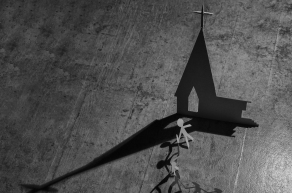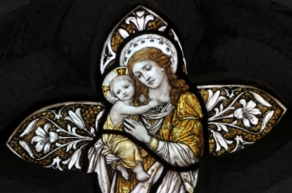
My seminary was a huge brick building circa 1960 or so. It was originally a seminary for Jesuit priests, and now houses a retirement community and nursing home for Catholic clergy, and functions as a large retreat center for many different groups.
One weekend a month for three years I would ride along as my friend Jan drove down the long, tree-lined drive. We’d park and lug a weekend’s worth of luggage inside, and before we were even in the doors our community would begin to form via shouted greetings in the parking lot and warm hugs in the lobby.
The Academy for Vocational Leadership is an Iona Collaborative school and is made up of many bi-vocational students and staff. On these long weekends we learned Church History, Systematic Theology, the Bible and literally dozens and dozens of practical courses, everything from music in small churches to Asset-Based Community Development.
Continue reading...

The disciples had been watching their Master immersed in prayer, sitting in silence for long periods of time, and they’d learned not to interrupt. Jesus regularly went off by himself before the first light of day, seeking a deserted place to commune with the Creator. The disciples could feel the power of those times and yearned to experience that for themselves. “Lord,” they asked, “teach us to pray.” (Luke 11:1)
So Jesus gave them some words of prayer: calling on God’s Name, proclaiming the coming of a holy kingdom and their dependence on the Creator, seeking forgiveness “for we forgive everyone,” and asking for help when trials come. This simple version of the Lord’s Prayer (expanded in the Gospel of Matthew) has such an impact that we still say it today. It probably wasn’t new to the disciples—we can all use a reminder—but from their disappointed looks, something more was needed.
Continue reading...

We live in a glut of information. Practically anyone can find any information or opinion that they wish if they put a few minutes of effort into it. As a result, people tend to mistrust scholarship. “I can think for myself!” is the constant refrain. Or, as I saw recently on Facebook, “We are all theologians by right of our baptism.”
In such a world, why on earth would I put the time, money, and effort into becoming a scholar? Why would anyone listen to a theologian?
The truth is: theological scholarship is so much more than just reading books.
Continue reading...

I am formed by the liturgy of camp; by singing to music led by amateur guitarists, pianists, and bongo drummers. We sat on a worn hardwood floor and listened to chaplains tell the stories of their lives and of God’s action in the world, all the while whispering to one another about what came next, telling secrets and laughing under our breath into a space made holy by our half attention and full presence. Each week, we gathered, still seated on that hardwood floor to share a cup of wine and a plate of bread, passing it from one set of dirty, sweaty hands to another. We would laugh and whisper, having no idea what we were doing, but knowing, somewhere, somehow, that this was set aside time. But also, perhaps, that it was time connected to all the rest- to the games, friendship bracelets, canoe trips and picnics where we would sit under shade trees and imagine a different kind of world, to the old table in the back of the main gathering room where generations of us would secretly carve our names into the soft wood with ballpoint pens knowing without knowing that we were a part of something bigger than ourselves. My understanding of church is still rooted under those shade trees, still carved into that old table, still sitting criss-cross on that worn hardwood floor, laughing and learning what it means to be the body of Christ together.
Continue reading...

“The beginning of the good news of Jesus Christ, the Son of God.” – Mark 1:1
This is not a headline nor a subtitle. It is a proclamation that the stories about to be related are about THE savior, God’s own son.
Biblical scholars tell us Mark was writing for Christian believers living in Rome, the epicenter of an empire that recognized the emperor as a god. It was good news indeed to be assured that this Jesus for whom they were risking their lives was truly God, not another human invention.
“I am going to start with the main point,” Mark seems to be thinking as he picks up his writing instrument, “The beginning of the good news of Jesus Christ, the Son of God.”
Continue reading...

If it is true that God brought Jesus into the world to turn it right side up, then COVID-19 and the global pandemic seem intent on turning the world upside down once again. The world has changed in radical and deadly ways. Not just for some but for all. This is not hyperbole. It is affecting each and every person from the loss of life, to the loss of jobs, to the loss of everyday freedoms.
Over the past few months I have had many conversations with professionals and volunteers I know in the Episcopal Church. In these conversations there is almost always a point at which we discuss how COVID-19 and the pandemic are affecting their ministries and lives. I have mostly heard their frustrations, their stresses and their anxieties. I have been led to commit to prayer for these people and all those they serve. I have been called to wonder about all those doing the work and ministry of God. I became very curious, in particular, about how those people committed to faith formation are functioning at this moment in time.
Continue reading...

With the COVID-19 pandemic came the precipitous end to in-person classes at Episcopal Divinity School at Union Theological Seminary in early March. Students who had the option to do so were strongly encouraged to leave seminary housing and get out of the virus epicenter in New York City, so we became physically scattered and separated from our worship space in the small chapel at Union.
Within days of the cessation of classes, the EDS worship team met over Zoom and came up with a plan. Our Monday through Thursday Morning Prayer schedule would resume by Zoom. We shortened the form of worship slightly, omitting the canticles but keeping the time for song that we had cherished when we had been physically together to pray the office. Because we shortened the service, we had the space to add a time of reflection after the Gospel reading. This gave us more interaction during the service in the virtual space. We kept the EDS at Union custom of reciting the Apostles’ Creed and Lord’s Prayer in Spanish.
Continue reading...

The COVID19 pandemic is not the first time Christianity has been faced with the moral question of how to respond in the face of pandemic. In fact, the question is nearly as old as the Church itself. One of the first times was during the third century Roman plague. Something likely akin to Ebola, the so-called Cyprian plague (after Bishop Cyprian of Carthage) which ravaged the Empire from 250-270 CE.
Just as they had in the Antonin plague of the second century, the powerful and well-to-do of the Empire fled the cities for the relative safety of their countryside villas, leaving the rest of the populace to fend for themselves. As attested to by both Christian and secular writers of the time, just as they did in the previous plague, the Galileans (as they were called) did the opposite, staying behind and even coming in from the countryside to feed the poor, care for the afflicted, comfort the dying, bury the dead, and to attend to public hygiene, doing this not just for the faithful but for their entire communities, Christian and non-Christian alike. It was, as Bishop Cyprian put it, their burden of care. Two remarkable things happened: they helped curb the contagiousness of the plague (the death rate was as much as 50% lower in cities with Christian communities) and the plague (or rather their response to it) helped make Christianity extremely contagious, so that it spread rapidly throughout the Empire.
Continue reading...

Sometimes, when my family and I have a Sunday off but we’re still in town, we pop into a local Presbyterian church for worship. They have great preaching and strong worship. Plus, it doesn’t hurt that very few people there know me or us. We slip in, enjoy worship, and go on with our day.
A traditional brick-and-mortar church, this congregation is known in our community as a strong, thriving church. They have great programs, a well-manicured campus, dynamic pastors, a good website – and it doesn’t hurt that their gym and nursery are top-notch!
But the one thing I really appreciate about them is their approach to Christian formation. They have Sunday morning classes, and youth group in the middle of the week. There’s a college-age group that meets in some kind of lounge space, and they pull together what they call a “Big Gathering” every now and then. But most of what they do in terms of formation and relationship-building happens Monday to Saturday … and not in their brick-and-mortar building.
Continue reading...

I sometimes surprise people by loving Paul. People expect me – as a woman, a feminist, a lifelong fan and (I hope!) practitioner of liberation theology – to squirm at least a bit at the mention of Paul’s name. So I figured that as we as the Episcopal Church embark on reading Paul’s longest contribution to the Biblical canon, I might just share all the reasons I love Paul, just in case your enthusiasm for reading the letter to the Romans needs a little boost.
I’ll start by clarifying that I subscribe to the widely held academic view that the seven letters properly attributed to Paul himself are 1 Thessalonians, Galatians, 1 Corinthians, Philippians, Philemon, most of 2 Corinthians and Romans. If Paul was the credible author of some of the later epistles written in his name, we’d need to have a further conversation.
Continue reading...

When I saw a new book, Walk in Love: Episcopal Beliefs and Practices, promoted on the Forward Movement website, I ordered it as a gift for a Roman Catholic friend who is on his way to being received into the Episcopal Church. As soon as it arrived, I began reviewing its contents and quickly ordered a second copy to keep.
Reading Walk in Love is like enjoying a fireside chat with a good friend who knows a lot more than you do but doesn’t make you feel that way. Authors and priests Melody Wilson Shobe and Scott Gunn comprehensively reveal the “what and the why” of what we believe and do, in friendly, conversational style. There is familiarity in their explanations, but plenty of “ah-hah” moments as deeper understanding sinks in.
Continue reading...

This month we offer five resources on discipleship. Please share this digest with new members of your vestry and extend an invitation to subscribe to ECF Vital Practices to receive Vestry Papers and the monthly digest.
1. What is discipleship? In Discipleship Matters, Richelle Thompson explains what the word means to her and challenges her readers to consider what it could mean to them. Are you growing as a follower of Jesus Christ?
Continue reading...

Following his triumphal entry into Jerusalem, Jesus stayed in the city. “Every day he was teaching in the temple,” Luke tells us (Lk.19:47), and we can feel the plot thickening. Indeed, “the chief priests, the scribes and the leaders of the people kept looking for a way to kill him.”
Continue reading...

I’ll be the first to admit: I don’t always want to start our leadership meetings with Bible study.
For the past two years, we have begun our weekly meetings with Bible study, first reading through Exodus and now the Gospel of Luke in conjunction with the Good Book Club. Sometimes I get to the meeting, harried and stressed with an overflowing to-do list, and I just want to get down to business.
And then somewhere in the midst of the scripture reading or the discussion with my colleagues, I am reminded that reading and exploring God’s Word is the foundation of our business as an organization committed to serving the wider church. If I can’t make Bible study a priority, then all else will suffer.
Continue reading...

You just can’t beat a Christmas pageant for rousing up “the Christmas spirit.” Children don scratchy robes, wooly onesies with ears, or sparkling tinsel halos, transporting them into what is likely the first Bible story they know by heart. Not as in memorizing the first chapters of Luke, but, as in their hearts.
Pageant participants’ pure belief ripples through the congregation. Together, we are corporately living up to what we promised we would do when we witnessed these child actors being baptized: supporting them in their life in Christ. As delighted as we are with the performance, we are warmed by the knowledge that they are learning about Jesus.
Continue reading...

A dear friend recently celebrated 10 years of ordained ministry. As part of his reflection on the role of the priest today, he asked me what qualities I thought priests needed to have today.
I loved this exercise, and I think the qualities that came to mind are true for all Christians, not just those ordained.
So, here they are:
Continue reading...

The most recent issue of the Diocese of Texas’ Dialog magazine is focused on faith, culture, and the ways that we live our faith in the midst of our daily lives. This got me thinking about some of the places I’ve seen folks serving Christ in the day-to-day.
There’s Dr. Beverly Vick, an angel on earth who is a first grade teacher in Alexandria, Va. For my oldest son, and countless other children for whom school can be challenging, Dr. Vick makes learning come alive. For my son’s birthday that year, he invited Dr. Vick to dinner, and I was amazed at the stories she shared of a life dedicated to teaching. And underpinning it all is her deep faith and love of Jesus.
Continue reading...

This week marks the end of school for many families across Texas, so summer begins. Schedules go wonky, people travel, kids go to camps, family comes to visit, and either we’re out of town on Sunday, or traveling, or it’s the one day we can breathe between one trip and the next camp.
This summer, the typical Christian formation offerings at my parish are on sabbath. Because… you know, schedules.
This year, we’ve created “Church on the Go” boxes to help bring faith to life this summer. Inside each box is a variety of ways to help us (and those we love) slow down, deepen relationships with one another, and grow closer to Jesus. Inside each box are coloring books for younger Christians, prayer journals for all ages, ideas for conversation starters, suggested books for every age, and more!
Continue reading...

We Episcopalians love our liturgy and our “color coded” church year (as comedian Robin Williams so cleverly coined it). The liturgical calendar keeps us moving through the Bible, celebrates the major milestones and miracles of our faith, highlights examples of saints we might emulate, and so much more.
Better understanding of the “so much more” is found in The Liturgical Year – The Spiraling Adventures of the Spiritual Life, authored by Benedictine Sister Joan Chittister. The book is great reading for anyone desiring a deeper experience of each season and celebration. In plain terms, Chittister wakes us up to what’s going on each Sunday, explain that, “Each church year moves with measured rhythm in order to knit Jesus’ life and vision into our own personal journeys through time.”
Continue reading...
Our kids are fishing chocolate coins and nuts out of their stinky sneakers. St. Nicholas visited last night, and this morning they rushed to the fireplace to see the treats left by their favorite saint.
Neither my husband nor I grew up with a St. Nicholas tradition. But when our children were born, we wanted to find a way to connect Santa Claus with the church, the receiving of gifts with generosity of spirit. St. Nicholas has been a good way to do that.
Continue reading...


















